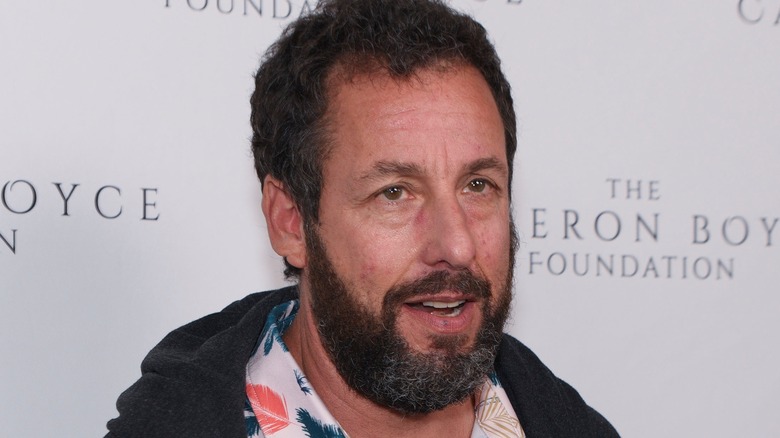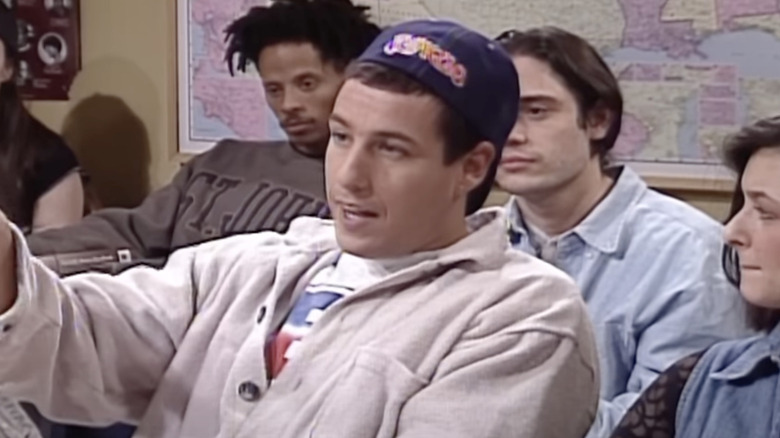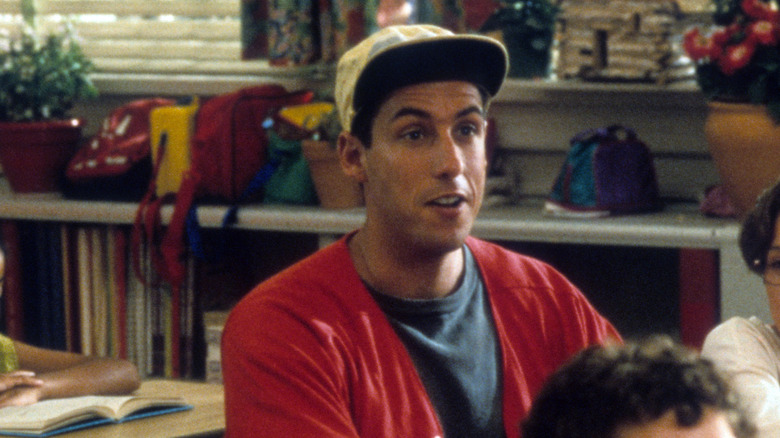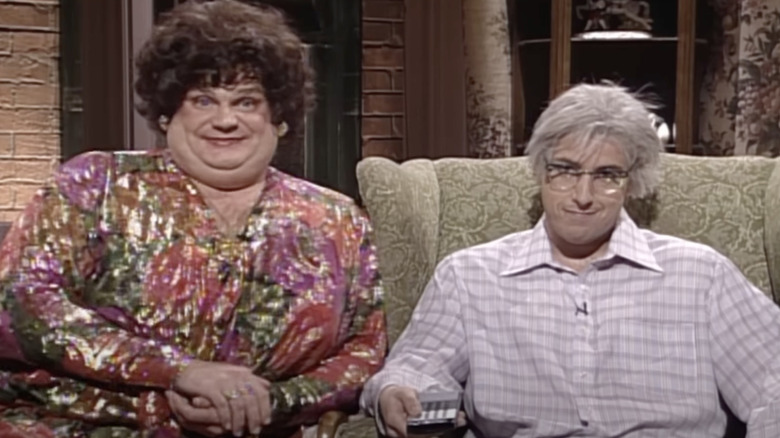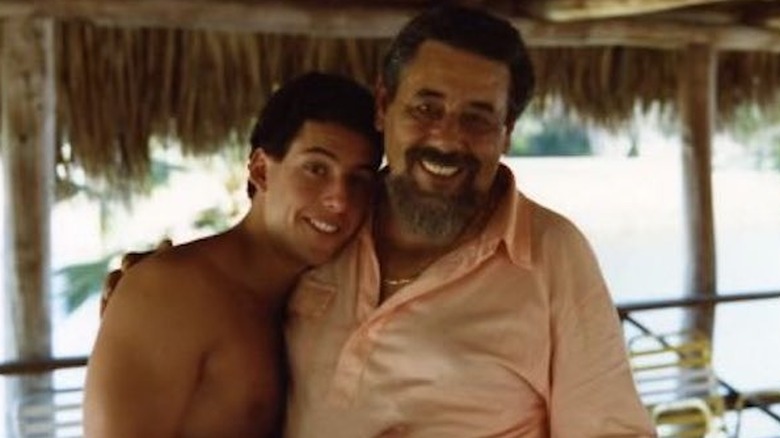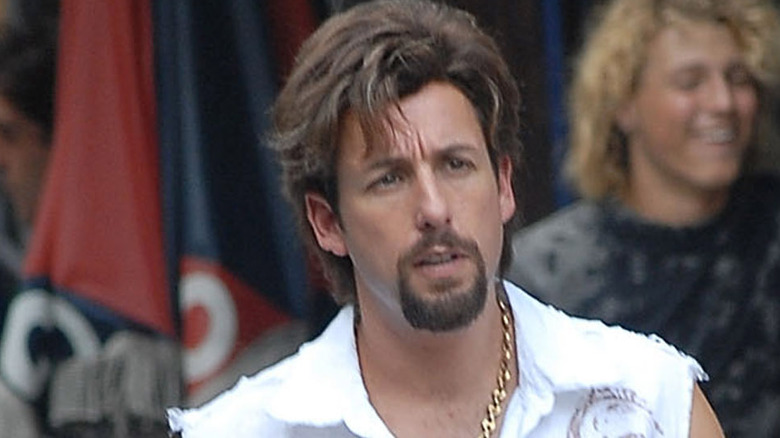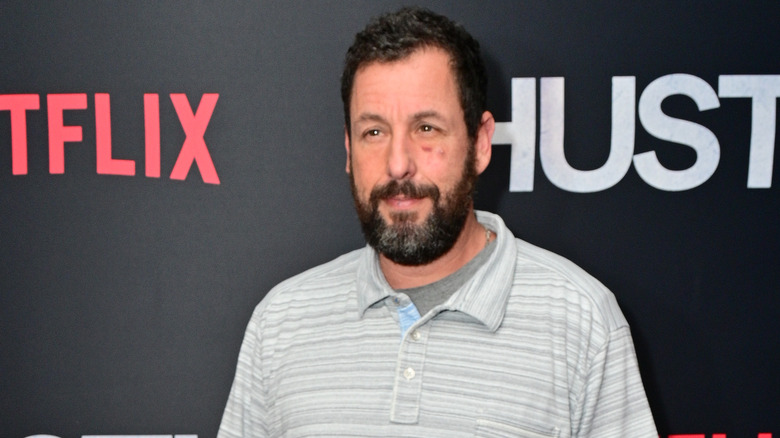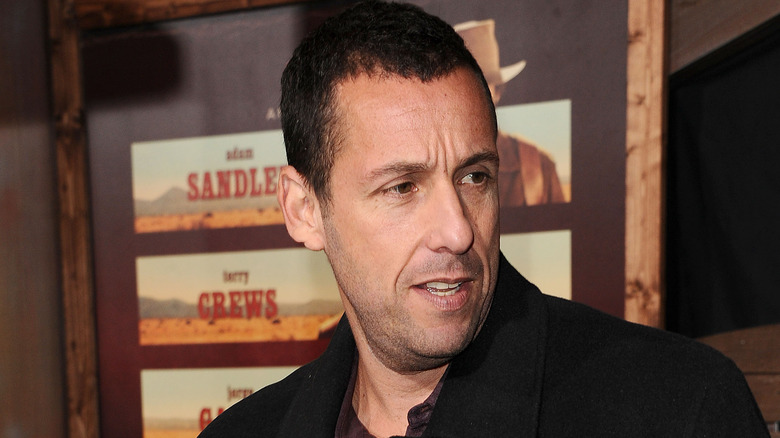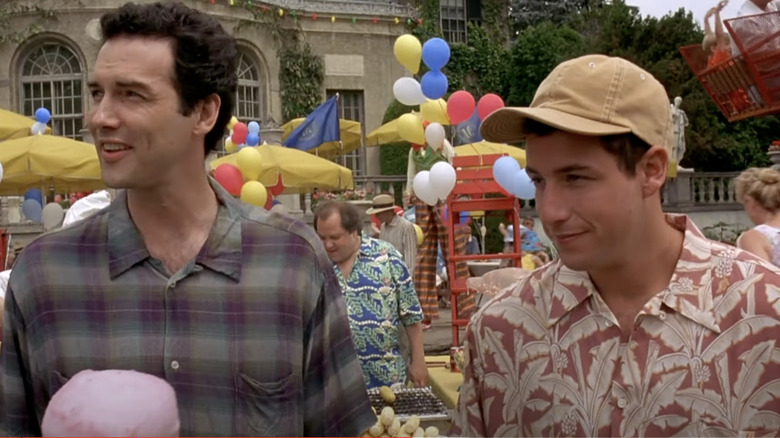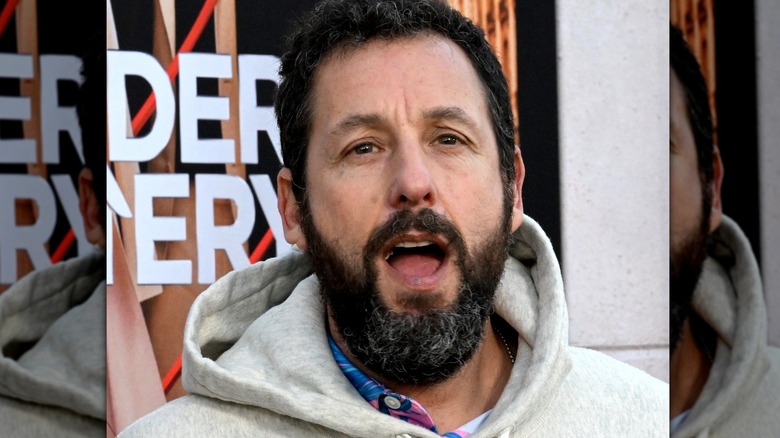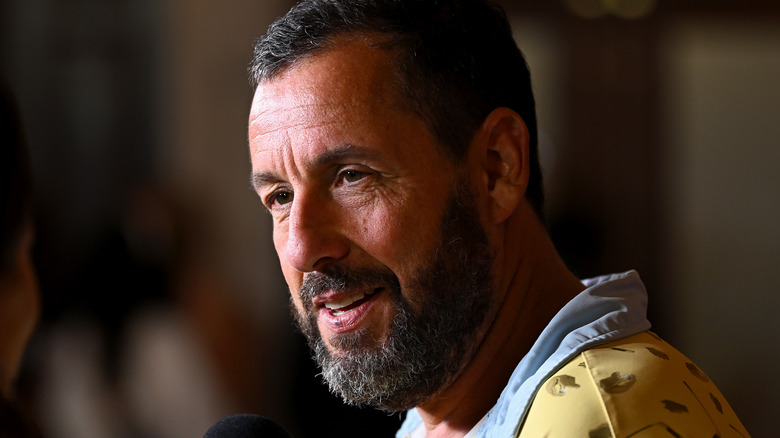The Tragedy Of Adam Sandler Explained
One will never go broke — or fail to delight the masses — by making funny faces, talking in silly voices, and giving audiences TV shows and movies that make them laugh over and over again. And that's why, across several genres, Adam Sandler is one of the most popular comedians of all time. After starring in some of the most famous and most controversial "SNL" skits of all time, Sandler went on to forge a consistently popular and lucrative movie career, writing and producing quotable, crowd-pleasing, and unabashedly silly hits, like "The Waterboy," "The Wedding Singer," "Click," "Grown Ups," "Murder Mystery," and "Hubie Halloween."
It's ironic but all too true that comedians who lived seriously tragic lives are the ones who make the funniest content. Sadly, Sandler is one of those performers. Throughout his professional and personal life, he's experienced an astounding amount of scandal, embarrassment, deaths of friends and relatives, health issues, and other unsavory parts of life. Here's a look into the tragic, sad side of one of the world's most beloved clowns, Adam Sandler.
Adam Sandler was fired from SNL
In the early 1990s, "Saturday Night Live" was dominated by a tight-knit group of male comics that came to be known as "the Bad Boys of 'SNL.'" The clique included David Spade, Chris Rock, Chris Farley, and Adam Sandler. In 1995, Sandler and Farley both extended their fame into popular comedy films, "Billy Madison" and "Tommy Boy," respectively. Nevertheless, right after those films proved successful at the box office and made Sandler and Farley more famous, along with substantial viewer draws to "SNL," they both left the show. Along with other false facts about "SNL" you always thought were true, Sandler and Farley didn't quit — they were cut. Sandler realized it wasn't a decision from anyone directly associated with the show, but an NBC executive who didn't care for the "bad boys of 'SNL.'"
Sandler was left feeling sad, angry, and confused, as "SNL" was his comedy home. "Maybe I would've never left because I'm not good at saying goodbye. They had to get rid of me somehow," he told "The Howard Stern Show" in 2019. "I was hurt because I didn't know what else I was gonna do." Sandler said the firing "put a lump in my throat" and that he and fellow dismissed cast member Farley pretended to be angry over the situation but that they were actually, secretly, deeply saddened and hurt.
Critical reviews left him traumatized
"Billy Madison" was the first film that Adam Sandler co-wrote and headlined in as an actor. A silly comedy about an immature goof who repeats his primary education in order to win favor with his businessman father, the 1995 film earned savagely negative reviews from critics. "A more moronic vehicle is hard to imagine," wrote Roger Hurlburt of the South Florida Sun-Sentinel, while Gene Siskel of the Chicago Tribune called it "The latest entry in the American cinema's investigation of dumb-and-dumber heroes."
The vitriol blindsided and upset an optimistic and earnest Sandler. "When 'Billy Madison' came out and I realized I'm going to be in the newspaper, that was a big deal," he told The Washington Post. "And then I read a couple reviews and I was like, 'Woof, that hurts.' I thought they would have a good time with it like I did." After critics piled on the hatred for his next starring vehicle, "Happy Gilmore," Sandler decided to stay away from reviews of his films as much as possible. "Maybe we shouldn't read this stuff because it's so harsh," he told Deadline, defending the avoidance as an act of mental preservation. "I invite all these amazing people I care about to make movies with me, and I wish they didn't have to read s*** about whatever we've made. But I don't get too shook up," he told AARP.
His friend Chris Farley died
Both "Saturday Night Live" standouts that became movie stars in the 1990s, Adam Sandler and Chris Farley developed a deep friendship during their time at the late-night sketch comedy show. Farley was heavily addicted to drugs and alcohol, and across 1996 and 1997, he entered and withdrew from 17 different rehabilitation programs. In December 1997, Farley checked himself out of a clinic and returned home to Chicago, where he misused drugs and alcohol to excess for the better part of four days. On December 18, 1997, the tragic real-life story of Chris Farley came to an end when the body of the 33-year-old was discovered in his apartment.
When Sandler returned to stand-up comedy in the 2010s, he performed an emotionally devastating number about his deceased friend, the "Chris Farley Song." "The first few times we played that song, I would tear up and I couldn't really sing it well because I'd get so emotional and then I felt it and was able to get it out there," Sandler told the "Happy Sad Confused" podcast (via NBC's "Today"). "And I remember his dad and I'm friends with his brothers and his mom and everybody and they still miss him a lot. So yeah, it gets me." Sandler included the song in his 2018 comedy special "100% Fresh" and when he made his first return appearance to "SNL" as a host in 2019.
If you or anyone you know needs help with addiction issues, help is available. Visit the Substance Abuse and Mental Health Services Administration website or contact SAMHSA's National Helpline at 1-800-662-HELP (4357).
Adam Sandler's father died of cancer
Adam Sandler was raised in New Hampshire by parents Judy, a teacher, and Stanley Sandler, an electrical contractor. The influence of Sandler's parents is a through-line throughout his work: he titled his 1999 album "Stan and Judy's Kid," and admitted that Stanley Sugerman — the basketball scout he played in the 2022 movie "Hustle" — was named after and based on his father. In a 2019 profile on "60 Minutes" (via People), Sandler readily admitted to idolizing his father, and in a 2020 Facebook post, he called him "The greatest man I ever knew." Sandler added: "Thanks for having me and miss you everyday."
The elder Sandler made his film debut in 2002, voicing the father of his son's character in the animated "Eight Crazy Nights." Not long after the release of that film, Stanley Sandler died at the age of 68 following a lung cancer diagnosis. The development of that fatal illness troubled Adam Sandler, and it stuck with him. "I went through stuff with my dad before he died. I saw firsthand what goes on with people who are incredibly sick," Sandler told Parade.
Adam Sandler was sued for copyright infringement and negligence
One of the more outlandish and seemingly original entries in the Adam Sandler canon was 2008's "You Don't Mess with the Zohan." In that movie Sandler played an Israeli counterterrorism agent with Mossad who tries to leave it all behind to be a hairdresser. However, a lawsuit suggested that Sandler and co-writers Robert Smigel and Judd Apatow weren't as wildly creative as it seemed, alleging copyright infringement and theft of the idea. Robert Cabell created internet cartoon character Jayms Blonde, another elite operative — in this case a Navy SEAL — who quits to become a hairdresser. In a logo, he holds a gun-hairdryer combo, similar to the way Sandler's character wields a hairdryer like a gun in the "Zohan" poster.
Caball claimed Sandler's production company knew about Jayms Blonde because a Happy Madison executive wrote to him on MySpace. After "Zohan" was made, Caball sent a cease and desist letter to Sandler and his cohort and attempted negotiations before filing a suit in 2009, because "Zohan" meant the end of a reportedly in-the-works Jayms Blond film. A judge dismissed the case in 2011.
Then Sandler and Happy Madison Productions dealt with a negligence lawsuit brought by a member of the set-building crew of the 2012 movie "That's My Boy." Carpenter Richard Houpert sued for $1 million after he accidentally had parts of some fingers excised and broke some hand bones while working with a table saw not fortified with safety equipment.
His Netflix deal was made partially out of spite and pain
In 2014, Netflix forged one of the most competitive and far-reaching deals in the still-nascent history of streaming, signing A-list movie star Adam Sandler to make four exclusive movies through his company, Happy Madison Productions. Six years later, Sandler extended the deal, and he's now made a dozen Netflix original films. While in the 2020s there's often an Adam Sandler movie crushing it on Netflix, at the time it was a risky career move for Sandler to lock down with one streamer and skip potentially lucrative theatrical runs altogether. It turns out that Sandler made the choice after some embarrassing, mean emails from executives at a major Hollywood studio hit the internet.
Hackers broke into Sony's email system in 2014, and released countless once-private messages to the public. Among the initial leaks were emails from influential Sony workers expressing annoyance with the perceived low quality of Sandler's films. Another released thread showed an email conversation between film executives, including Sony co-chairperson Amy Pascal and Hannah Minghella — production co-president of subsidiary Columbia Pictures — discussing a Sandler-led "Candyland" movie. In the messages, she calls Sandler an "a******" for asking for a $200 million budget, and the comedian's production cronies "such a*******" over a similar money snafu involving "Hotel Transylvania 2."
His first Netflix movie was mired in accusations of racism and sexism
The first movie Adam Sandler and his production company made for Netflix was "The Ridiculous 6," a Western intended to send up the dated and offensive tropes associated with that genre. About 12 Native American performers walked off the set. "They told me it was going to be a comedy, but it would not be racist," actor Loren Anthony told Indian Country Today Media Network, adding that he and others were meant to play Apache, despite not resembling members of that community. "They just treated us as if we should just be on the side." When some of the Native American actors spoke with Sandler and other producers, they were told that the script wouldn't be changed. "It was just a misunderstanding and once the movie is out will be cleared up," Sandler said to the Associated Press (via Variety).
In another scandal related to "The Ridiculous 6," actor Rose McGowan mentioned on social media that she was asked to audition for the film while adhering to a wardrobe request: figure-hugging, bust-enhancing, and revealing clothes. Calling out Sandler led McGowan's agency to drop her as a client. "I'm not trying to vilify Adam Sandler. Although someone did tell me that when he did his Netflix deal, he said, 'I signed with Netflix because it rhymes with "Wet Chicks."' I mean, what? What in the f*** is going on? No!" McGowan told Entertainment Weekly.
Norm Macdonald died
Adam Sandler doesn't do a lot of solo, in-depth interviews, but he broke that unofficial rule in 2022 to participate in a roundtable-style memorializing of his dear friend and frequent collaborator, Norm Macdonald. Macdonald joined "Saturday Night Live" as a writer and cast member in 1993, toward the end of Sandler's long run on the sketch show, but they didn't really work closely together until the 1995 movie "Billy Madison," in which Macdonald portrayed Frank, the best friend of Sandler's title character. A comedian rumor that turned out to be true, in 1998, Macdonald was fired from "SNL," much like Sandler three years prior; the two "SNL" cast-offs would work together in only three more movies over the years, but became very close off-screen.
Macdonald's sudden death in 2021 came as a shock, as while the comic was diagnosed with cancer nine years earlier, he kept it a secret from the public and many of his relatives and friends. Sandler was understandably distraught. "Every one of us loved Norm. Some of the hardest laughs of my life with this man," Sandler wrote on X, formerly known as Twitter. "Most fearless funny original guy we knew An incredible dad. A great friend. A legend. Love u pal."
On-set injuries led to a hip replacement surgery for Adam Sandler
In 2022, Adam Sandler shot two seemingly different movies virtually back to back: the action-comedy sequel "Murder Mystery 2" and the space-set sci-fi drama "Spaceman." Sandler largely acted as his own stuntman on both projects, and an injury sustained in one production was exacerbated while working on the other. "I did 'Spaceman' and I was hanging in the harness all the time. I kept saying, 'Something's going on with my hip, man. I'm in trouble," he recalled to Variety at the "Murder Mystery 2" premiere. "And then during this and this other movie I did I was like, 'Yeah, I definitely gotta x-ray that thing,' and we were in trouble."
Not long after he finished filming his last scenes for "Murder Mystery 2," Sandler submitted to a hip replacement surgery, lamenting, "Everything's scary at 56 years old. You never know what the hell you're gonna get up from. I'm sluggy, man. My body hurts."
He's addressed some mental health concerns
Adam Sandler has generated a lot of boisterous, happy comedy about negative emotions. In the early years of his career especially, Sandler specialized in playing immature grown men on the fringes, often with anger management problems: a hot-headed golfer in "Happy Gilmore," a rage-prone entrepreneur in "Punch-Drunk Love," a depressed musician in "The Wedding Singer," and a guy in anger management in "Anger Management," for example. Sandler shares a lot of those emotional and mental health issues with the characters he chooses to play and write. "I just have a natural part of my brain that feels like I don't belong here," Sandler told the "Little Gold Men" podcast (via Fox News). "This feeling uncomfortable and loser stuff I've been doing for years, it's in me."
Sandler says he's grown more peaceful with age. "I had a quick temper, quick reactions. I made a lot of dumb mistakes and said a lot of stupid things," he told AARP. The actor sought out therapy to further help himself. "I talk to a shrink sometimes. He's given me a plan. Sometimes just holding in a sentence, taking a beat for a minute before saying something stupid."
If you or someone you know needs help with mental health, please contact the Crisis Text Line by texting HOME to 741741, call the National Alliance on Mental Illness helpline at 1-800-950-NAMI (6264), or visit the National Institute of Mental Health website.
